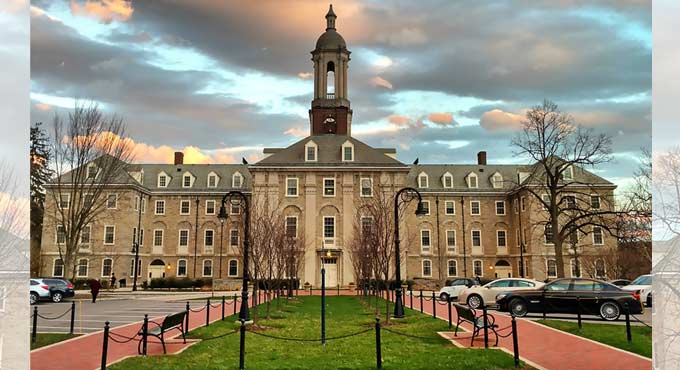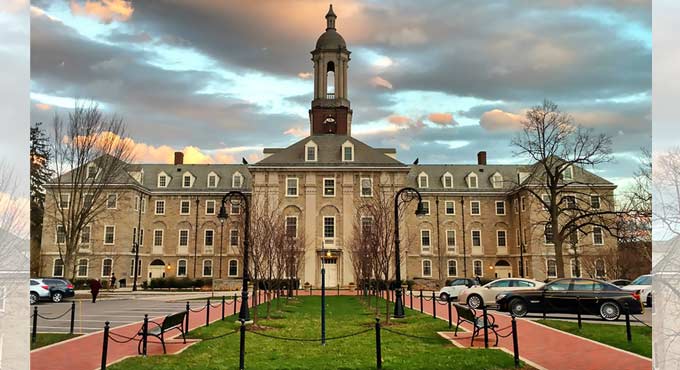Introduction
Pennsylvania State University, commonly known as Penn State, is a beacon of academic excellence, innovation, and community spirit. With a rich history that spans over 150 years, Penn State stands as one of the leading public universities in the United States, known for its commitment to research, student engagement, and global outreach. Whether you’re considering Penn State for its academic programs, vibrant campus life, or storied traditions, there’s no denying the significant role this institution plays in shaping future leaders.
History of Pennsylvania State University
Founding and Early Years
Penn State was founded in 1855 as the Farmers’ High School of Pennsylvania, reflecting its early focus on agriculture and the mechanical arts. Over the decades, the institution evolved, broadening its academic offerings and changing its name to the Agricultural College of Pennsylvania, and later, Pennsylvania State College.
Development Through the 20th Century
The 20th century was a period of significant growth for Penn State. The university expanded its campuses, increased its research output, and became a leader in various academic disciplines. By 1953, it achieved university status, becoming Pennsylvania State University, a name that reflects its broad scope and impact.
Key Milestones and Achievements
Penn State’s history is marked by numerous milestones, including the establishment of its College of Engineering in 1896, the creation of the World Campus for online education in 1998, and its consistent ranking among the top public universities in the nation. The university has also been at the forefront of research in fields like materials science, agricultural sciences, and engineering.
Campus Locations
Overview of the Main Campus in University Park
University Park, the main campus of Penn State, is located in State College, Pennsylvania. It’s the largest of Penn State’s campuses, home to more than 46,000 undergraduate students. The campus features state-of-the-art facilities, including modern classrooms, research labs, and student amenities.
Description of Commonwealth Campuses
In addition to University Park, Penn State has 19 Commonwealth Campuses spread across Pennsylvania. These campuses offer a range of undergraduate programs and provide access to Penn State’s resources in more localized settings. They are integral to Penn State’s mission of providing affordable and accessible education to students across the state.
Specialized Campuses
Penn State also operates specialized campuses, such as Penn State Hershey, which focuses on medical education and research, and Penn State Great Valley, which offers graduate programs in business and engineering. These campuses serve specific educational needs and contribute to the university’s overall mission.
Academic Programs and Departments
Overview of Undergraduate Programs
Penn State offers a wide array of undergraduate programs across various fields, including business, engineering, liberal arts, and the sciences. With over 160 majors to choose from, students have the flexibility to tailor their education to their interests and career goals.
Graduate and Professional Programs
For those pursuing advanced degrees, Penn State provides robust graduate and professional programs. These include MBA programs at the Smeal College of Business, advanced engineering degrees, and a range of programs in the health sciences. The university’s graduate programs are known for their rigor and research opportunities.
Notable Colleges and Schools
Penn State is home to several notable colleges and schools, including the College of Engineering, the Eberly College of Science, and the College of Agricultural Sciences. These colleges are renowned for their contributions to their respective fields and offer students access to world-class faculty and research facilities.
Online Learning and World Campus
Penn State’s World Campus is a pioneer in online education, offering more than 150 accredited degree and certificate programs. This platform allows students to earn a Penn State degree from anywhere in the world, making higher education more accessible.
Research at Pennsylvania State University
Overview of Research Facilities and Institutes
Penn State is a research powerhouse, with facilities like the Materials Research Institute and the Huck Institutes of the Life Sciences leading the way in innovation. The university’s research infrastructure supports a wide range of disciplines, from engineering to the social sciences.
Major Research Areas
The university excels in several key research areas, including materials science, agricultural sciences, and energy. Penn State researchers are at the forefront of developing new technologies and solutions to global challenges, contributing significantly to their fields.
Collaborations and Partnerships
Penn State collaborates with industry, government, and other academic institutions to advance research. These partnerships enhance the university’s research capabilities and provide students with unique opportunities to work on cutting-edge projects.
Impact of Research on Society
The impact of Penn State’s research is far-reaching, from innovations in medical treatments to advancements in sustainable energy. The university’s research efforts contribute to societal well-being and economic development, making a real difference in the world.
Student Life at Penn State
Housing and Residence Life
Penn State offers a variety of housing options, including traditional dormitories, apartment-style living, and special interest housing. Residence life is a key part of the student experience, fostering community and providing support for academic and personal growth.
Student Organizations and Clubs
With over 1,000 student organizations and clubs, there’s something for everyone at Penn State. These organizations offer students opportunities to explore their interests, develop leadership skills, and make lifelong friends.
Athletics and Sports Culture
Penn State is known for its strong athletics programs, particularly its football team, the Nittany Lions. The university’s sports culture is vibrant, with students, alumni, and fans showing immense pride and support for their teams.
Arts and Cultural Activities
Beyond sports, Penn State offers a rich array of arts and cultural activities. The university hosts performances, exhibitions, and events that showcase the talents of students and faculty, contributing to a vibrant campus culture.
Diversity and Inclusion
Commitment to Diversity at Penn State
Penn State is committed to creating a diverse and inclusive environment for all students, faculty, and staff. The university actively works to ensure that everyone feels welcome and valued, regardless of their background.
Programs and Initiatives Supporting Inclusion
The university offers numerous programs and initiatives to promote diversity and inclusion, including cultural centers, scholarships, and mentorship programs. These efforts help create a supportive community where all members can thrive.
Student and Faculty Diversity Statistics
Penn State is home to a diverse student body and faculty, with representation from all 50 states and over 130 countries. The university continuously strives to increase diversity and ensure equity in all aspects of campus life.
Penn State’s Global Impact
International Partnerships and Programs
Penn State has established numerous international partnerships that enhance its global reach. These partnerships support collaborative research, student exchanges, and academic programs that prepare students for a globalized world.
Study Abroad Opportunities
The university offers a wide range of study abroad opportunities, allowing students to gain international experience while earning credit towards their degrees. These programs are designed to broaden students’ perspectives and enhance their academic and personal development.
Global Research Contributions
Penn State’s research has a global impact, addressing issues like climate change, public health, and sustainable development. The university’s researchers work on projects that have the potential to benefit communities around the world.
Penn State Alumni Network
Overview of the Alumni Association
The Penn State Alumni Association is one of the largest and most active alumni networks in the world, with over 700,000 members. The association provides a range of services, including networking opportunities, career support, and events that keep alumni connected to the university.
Notable Alumni and Their Achievements
Penn State alumni have made significant contributions in various fields, from business and politics to science and the arts. Notable alumni include astronaut Guion Bluford, former U.S. Senator Rick Santorum, and Nike CEO John Donahoe.
Alumni Involvement and Giving Back
Alumni play a vital role in supporting Penn State through donations, mentoring current students, and participating in university events. Their involvement helps ensure that Penn State continues to thrive and evolve.
Community Engagement and Outreach
Community Service and Volunteering Programs
Penn State encourages students to engage in community service and volunteer work. The university offers numerous opportunities for students to get involved, from local service projects to international humanitarian efforts.
Penn State’s Role in Local and Statewide Communities
Extension and Continuing Education Programs
Penn State’s Extension programs provide valuable resources and education to individuals, businesses, and communities across the state. These programs cover a wide range of topics, from agriculture and natural resources to health and wellness.
Sustainability Initiatives
Penn State’s Commitment to Sustainability
Penn State is dedicated to sustainability, with initiatives aimed at reducing its environmental impact and promoting sustainable practices on campus. The university’s sustainability efforts are integrated into its operations, research, and education.
Green Campus Initiatives
The university has implemented numerous green campus initiatives, including energy-efficient buildings, waste reduction programs, and sustainable transportation options. These efforts help reduce Penn State’s carbon footprint and promote environmental stewardship.
Research in Environmental Sustainability
Penn State is a leader in research on environmental sustainability, with projects focused on renewable energy, climate change mitigation, and sustainable agriculture. The university’s research contributes to global efforts to address environmental challenges.
Admissions Process
Undergraduate Admissions Requirements
Penn State’s undergraduate admissions process is competitive, with applicants evaluated on their academic achievements, extracurricular involvement, and personal statements. The university seeks students who are not only academically strong but also demonstrate leadership and community engagement.
Graduate Admissions Process
For graduate admissions, Penn State considers factors such as academic performance, research experience, and letters of recommendation. The university’s graduate programs attract top candidates from around the world, offering rigorous academic training and research opportunities.
Financial Aid and Scholarships
Penn State provides a range of financial aid options, including scholarships, grants, loans, and work-study programs. The university is committed to making education affordable and accessible to all students, regardless of their financial background.
Penn State Athletics
Overview of Nittany Lions Sports Teams
Penn State’s athletics program is one of the most successful in the country, with 31 varsity teams competing in the NCAA Division I. The Nittany Lions are particularly known for their achievements in football, wrestling, and volleyball.
Key Achievements in Athletics
Penn State’s athletics teams have won numerous championships and produced a long list of professional athletes. The university’s commitment to excellence in sports is matched by its focus on academic success for student-athletes.
The Role of Athletics in University Life
Athletics play a central role in university life at Penn State, fostering school spirit and bringing the community together. The university’s athletic events, especially football games, are major social events that draw large crowds of students, alumni, and fans.
Rankings and Accolades
National and Global Rankings
Penn State consistently ranks among the top public universities in the United States and is recognized globally for its academic programs and research. The university’s strong reputation is reflected in its rankings in various categories, including business, engineering, and education.
Program-Specific Rankings
Several of Penn State’s programs are highly ranked, including the Smeal College of Business, the College of Engineering, and the College of Agricultural Sciences. These programs are known for their excellence in teaching, research, and industry partnerships.
Awards and Recognitions
Over the years, Penn State has received numerous awards and recognitions for its contributions to education, research, and public service. The university’s achievements are a testament to its commitment to excellence and its impact on society.
Conclusion
Pennsylvania State University is more than just an academic institution; it’s a community that fosters growth, innovation, and leadership. With a rich history, diverse academic programs, and a commitment to research and service, Penn State offers students a unique and enriching educational experience. Whether you’re drawn to its academic excellence, vibrant campus life, or global impact, Penn State is a place where you can thrive and make a difference.

See Also: Best Universities in the USA 2024
Amazing Benefits Of MBA From University of Florida
FAQs
1. What is Penn State known for academically?
Penn State is known for its strong programs in engineering, business, and agricultural sciences, as well as its leadership in research and online education.
2. How many campuses does Penn State have?
Penn State has 24 campuses across Pennsylvania, including the main campus at University Park and 19 Commonwealth Campuses.
3. What is the acceptance rate at Penn State?
The acceptance rate at Penn State varies by campus and program, but the overall acceptance rate for the University Park campus is around 50%.
4. What are the most popular majors at Penn State?
Popular majors at Penn State include Business, Engineering, Computer Science, and Biology.
5. How can I apply to Penn State?
You can apply to Penn State through the university’s online application portal or the Common Application. Be sure to check the specific requirements and deadlines for your program of interest.



